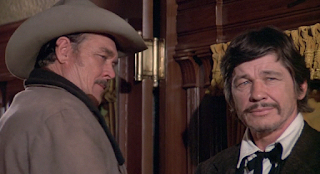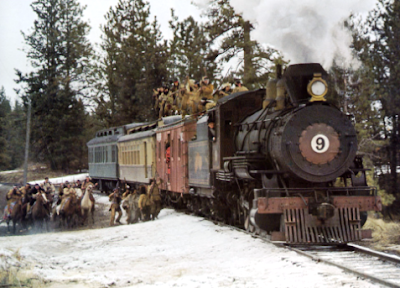directed by Tom Gries
screenplay Alistair MacLean from his own book
music by Jerry Goldsmith
 |
| Charles Bronson |
Breakheart Pass, directed by Tom Gries is a movie that, I admit, holds a special place for me because I watched it with my dad. He was a huge Western fan, as well as a fan of MacLean and Bronson. Gries was another of those utility directors Hollywood used to be filled with. In addition to loads of tv episodes (he created The Rat Patrol), he directed one of Charlton Heston's best movies, the Western Will Penny (1968).* He also directed two of the best miniseries of the seventies: QB VII (1974) and Helter Skelter (1976). Breakheart Pass, unfortunately, doesn't match the quality of those films. Instead, it's just an average suspense thriller with a few fun, if not surprising, twists.
 |
| Ben Johnson and Bronson |
The movie opens with a train filled with soldiers, the Governor Fairchild of Nevada (Richard Crenna) and his fiancée, Marica (Jill Ireland - Bronson's wife, and co-star in 15 movies) making its way through the snow-covered mountains toward Fort Humboldt, stopping at the whistle-stop, Myrtle. While there, Marshal Pearce (Ben Johnson), with prisoner John Deakin (Bronson), forces his way onto the train over the soldiers' commander, Major Claremont (Ed Lauter) wishes. Deakins, a doctor and ex-college lecturer, it seems is wanted for a host of crimes including destroying a cache of Army munitions, making it a federal crime, and one for which the Marshal can demand he and his prisoner be taken on as passengers. Along with the train's crew, there are several other passengers, including Doctor Molyneux (David Huddleston), O'Brien, an aide to the governor (Charles Durning), and the Rev. Peabody (Bill McKinney). As you can see, that's about as solid a mix of character actors as you could ever have in a movie.
 |
| Jill Ireland |
What follows is a moderately exciting actioneer. Most of the several mysteries - why is the train going to Fort Humboldt, what's in the cases, and who killed the doctor, among others - are revealed fairly soon. Too soon, for Bronson's tastes, according to Wikipedia. He wanted a particular big reveal kept towards the end as it was in the initial script.
The action scenes, largely outdoors (and often on the roof of the train) are pretty good. The several fights are good and brutal, and the film's climax with Indians (played by members of the Nez Perce tribe) and bandits fighting Deakins and company on the train is well done and looks great in the snowy countryside. It was also legendary stuntman Yakima Canutt's last movie. At age 79, he served as second unit director and coordinated the stunning derailment scene.
Unfortunately, Breakheart Pass suffers from a trait common to many seventies movies - much of it looks like a tv-show. The interiors in Myrtle when Deakins is arrested and all the shots inside the train look lousy. It's not just the rear-projection shots of the passing landscape - something even Hitchcock had trouble making look good - but there's something about the way the scenes are framed and lit that makes them look fake and cheap.
 |
| Eddie Little Sky |
 |
| Robert Tessier |
Right after watching the movie, I picked up the book. I've never read any MacLean before and I doubt I'll ever read anything again (except maybe The Guns of Navarone). Maybe his contemporary thrillers are better, but this is bad. Elliot Kastner, one of the producers (who'd previously produced two other movies based on MacLean books: Where Eagles Dare and When Eight Bells Toll) had given the author an office in the studio to "therapy, as he says MacLean was suffering in his marriage and with alcoholism." The dialogue is stilted, the characters are given too much unbelievable background, and all sorts of Britishisms are left unchanged in a book set in 1870's Nevada. It's not very evocative of the setting. The screenplay, by MacLean himself, improves things greatly. It deletes all the silly backstory and makes Levi Calhoun (Sepp Calhoun in the novel), much more evil and threatening. It does eliminate some of the villains' motivations, but it's not enough of a loss to matter. The Idaho filming location more than makes up for the book's lack of any appreciable period atmosphere.
Rating - C: Rewatching Breakheart Pass after several years with a more critical eye still left me liking the movie. The soundtrack by Jerry Goldsmith is suitably rousing and as described, the action is too. Nonetheless, there's really no great reason to seek this movie out unless you're a Bronson fan - which I am. I really want to give this movie a B but it's really a C. If it's on, leave it on, and if you find the DVD for a dollar or two it's worth it, but that's about it.
The film's setting, somewhere in the Sierra Nevada Mountains, but outside of Carson City and involving ore from the Comstock Lode, is a little hard to pinpoint. Let's just say it's somewhere in western Nevada. Northern Idaho in the Lewiston area seems an adequate enough stand-in and a better one than happens in many Westerns.
Rating System
A: Ace - Brilliant or groundbreaking; one of the best that no fan should miss.
B: Bravo - Good stuff, but less than perfection
C: Cowpoke - Routine oater, filler
D: Dismal - Sloppy or junky, but either way not worth the runtime






MacLean's novels composed a decent chunk of my reading when I was twelve or thirteen, along with Ian Fleming. Where Eagles Dare, Guns of Navarone, Athabasca, etc. All good, pot-boiling stuff.
ReplyDeleteThey all look good, and so many people dig them. Maybe Westerns just weren't his thing - and he was clearly in a bad place when he wrote BhP
ReplyDelete